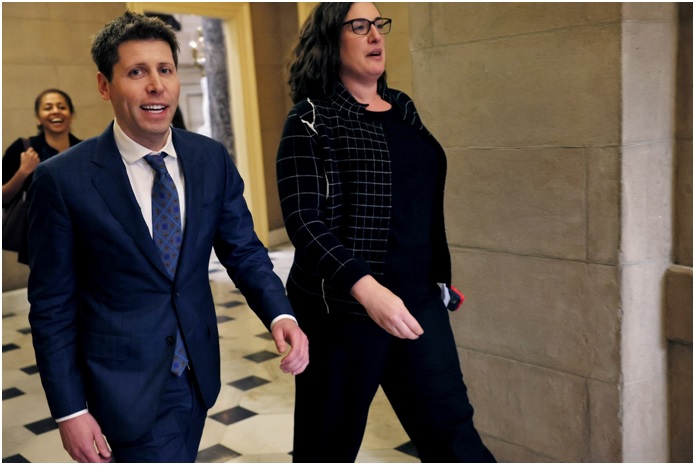Technology
OpenAI CEO Sam Altman and U.S. House Speaker Discuss AI Risks on Capitol Hill

Highlights
- OpenAI CEO Sam Altman discusses AI risks with U.S. House Speaker Mike Johnson on Capitol Hill.
- Biden administration faces challenges in passing AI regulations due to a divided Congress.
- Europe leads in AI regulations, outpacing the U.S. in legislative developments.
- Altman and Johnson focus on balancing AI benefits and risks during their meeting.
- OpenAI, initially a nonprofit, shifted to a capped-profit structure in 2019.
- Microsoft, a key backer of OpenAI, holds a non-voting position on the company’s board.
- Altman’s brief ousting from OpenAI in November raises concerns and results in leadership changes.
- President Biden’s October executive order mandates AI developers to share safety test results with the federal government.
- Excitement expressed by Altman regarding the legislative process’s role in addressing AI challenges and risks.
In a recent meeting on Capitol Hill, OpenAI CEO Sam Altman engaged in discussions with Republican U.S. House Speaker Mike Johnson about the risks associated with artificial intelligence (AI). The meeting, which took place on January 11, 2024, centered on the challenges and opportunities posed by AI technology.
Here are the key points from the interaction:
Importance of the Meeting
The Biden administration has been actively championing the cause of AI regulation, underscoring the importance of mitigating potential risks associated with this rapidly advancing technology. However, the efforts to establish comprehensive AI regulation face obstacles in a polarized U.S. Congress. With Republicans in control of the House and Democrats holding a Senate majority, the legislative process encounters challenges in achieving a unified approach to regulating AI. This political divide hampers the progress toward enacting regulations that can effectively address the complexities and concerns surrounding artificial intelligence.
Concerns Surrounding AI
The rise of artificial intelligence (AI) has sparked concerns worldwide, particularly regarding its potential to disrupt democracy, enable fraud, and contribute to job displacement. In contrast to the United States, Europe has taken a proactive stance by leading in the development of AI regulations. European countries are at the forefront of crafting guidelines to govern the ethical use of AI, demonstrating a commitment to balancing innovation with safeguards.
This regulatory approach aims to ensure that AI advancements align with democratic principles, combat fraudulent activities, and address potential job losses. European regulations set a precedent for other regions navigating the complex challenges posed by AI, offering a model for responsible and ethical integration of this transformative technology.
Quotes from the Meeting
In a recent meeting spearheaded by Speaker Mike Johnson, discussions centered around the dual aspects of AI, focusing on its promises and potential risks. The Speaker’s office conveyed the objective of the gathering as an exploration into the delicate balance between encouraging innovation and being vigilant about the inherent risks associated with AI and other technologies. Emphasizing the importance of congressional involvement in fostering innovation responsibly, Speaker Johnson underscored the need to navigate the complexities of this transformative technology.
OpenAI CEO, Sam Altman, echoed these sentiments, emphasizing the imperative to strike a balance between the considerable benefits of AI and the essential task of mitigating associated risks. Altman expressed optimism about the legislative process playing a crucial role in effectively addressing the challenges posed by AI, underscoring the collaborative effort needed to harness its potential responsibly.
OpenAI’s Background
OpenAI, originally established as an open-source nonprofit organization, underwent a significant transformation in 2019, transitioning to a capped-profit structure under the leadership of co-founder Sam Altman. This change marked a strategic shift in the organization’s approach. Altman highlighted the involvement of Microsoft, revealing that the tech giant holds a non-voting observer position on OpenAI’s board. This collaboration underscores the intersection of public and private interests in advancing artificial intelligence research and development, providing both a financial structure for sustainability and strategic partnerships to further OpenAI’s mission.
Recent Developments
In a noteworthy development in November, Sam Altman faced a brief removal from OpenAI without a detailed cause, raising concerns among investors and employees. However, Altman was swiftly reinstated with a commitment to forming a new board. This incident brought attention to the internal dynamics of the organization and its leadership.
In a related context, President Biden signed an executive order in October, mandating developers of AI systems with potential risks to national security, the economy, and public safety to share safety test results with the federal government. This move reflects a broader effort to ensure transparency and accountability in the deployment of AI technologies with significant implications for various sectors.
The meeting between Sam Altman and Speaker Mike Johnson underscores the ongoing efforts to navigate the complex landscape of AI regulation, acknowledging both its potential and the imperative to address associated risks. As discussions continue, the role of legislative processes in shaping the future of AI in the U.S. remains a focal point of attention.



















































